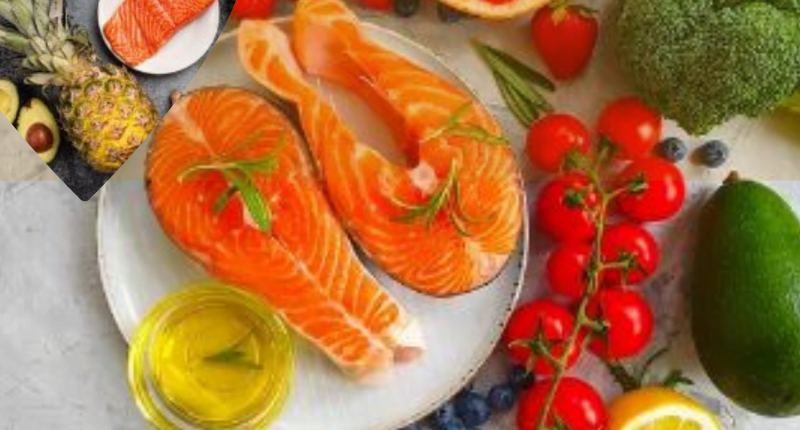Inflammation is a natural process that occurs in the body in response to injury or infection. However, chronic inflammation can lead to various diseases, including cancer, diabetes, arthritis, and heart disease. Consuming a diet rich in anti-inflammatory foods can help reduce inflammation in the body and lower the risk of these diseases. In this article, we will discuss 26 foods that are rich in anti-inflammatory properties.
Anti-Inflammatory Diet
An anti-inflammatory diet includes foods that are high in antioxidants, omega-3 fatty acids, and fiber. These foods help reduce inflammation and improve overall health. Here are 26 foods that are rich in anti-inflammatory properties.
1. Berries
Berries such as strawberries, blueberries, raspberries, and blackberries are rich in antioxidants that help reduce inflammation in the body. They are also high in fiber, which promotes good digestive health. Berries can be eaten fresh or used in smoothies, oatmeal, and baked goods to add flavor and health benefits. [1]
2. Fatty Fish
Fatty fish such as salmon, tuna, and sardines are rich in omega-3 fatty acids, which have anti-inflammatory properties. Eating fatty fish twice a week can help reduce the risk of heart disease and other chronic diseases. [2]
3. Olive Oil
Olive oil is a staple in the Mediterranean diet, which is known for its anti-inflammatory properties. It is rich in monounsaturated fatty acids and antioxidants, which help reduce inflammation and lower the risk of heart disease. [3]
4. Turmeric
Turmeric is a spice that has been used in traditional medicine for centuries. It contains a compound called curcumin, which has powerful anti-inflammatory properties. Turmeric can be added to soups, stews, and curries to add flavor and health benefits. [4]
5. Ginger
Ginger is another spice that has anti-inflammatory properties. It contains compounds called gingerols and shogaols, which help reduce inflammation and relieve pain. Ginger can be added to teas, smoothies, and stir-fries to add flavor and health benefits. [5]
6. Garlic
Garlic is a staple in many cuisines and has been used for medicinal purposes for centuries. It contains a compound called allicin, which has anti-inflammatory properties. Garlic can be added to soups, stews, and sauces to add flavor and health benefits. [6]
7. Broccoli
Broccoli is a cruciferous vegetable that is rich in antioxidants and fiber. It also contains a compound called sulforaphane, which has anti-inflammatory properties. Broccoli can be steamed, roasted, or added to salads to add flavor and health benefits. [7]
8. Spinach
Spinach is a leafy green vegetable that is rich in antioxidants and fiber. It also contains a compound called lutein, which has anti-inflammatory properties. Spinach can be steamed, sautéed, or added to salads to add flavor and health benefits. [8]
9. Kale
Kale is another leafy green vegetable that is rich in antioxidants and fiber. It also contains a compound called kaempferol, which has anti-inflammatory properties. Kale can be steamed, roasted, or added to salads to add flavor and health benefits.[9]
10. Tomatoes
Tomatoes are rich in lycopene, a powerful antioxidant that helps reduce inflammation. They are also high in vitamin C, which has anti-inflammatory properties. Tomatoes can be added to salads, soups, and sauces to add flavor and health benefits. [10]
11. Avocado
Avocado is a fruit that is rich in monounsaturated fatty acids and antioxidants. It also contains a compound called beta-sitosterol, which has anti-inflammatory properties. Avocado can be added to salads, sandwiches, and smoothies to add flavor and health benefits. [11]
12. Sweet Potatoes
Sweet potatoes are a root vegetable that is rich in beta-carotene, a powerful antioxidant that helps reduce inflammation. They are also high in fiber, which promotes good digestive health. Sweet potatoes can be baked, roasted, or mashed to add flavor and health benefits. [12]
13. Green Tea
Green tea is a beverage that is rich in antioxidants called catechins, which help reduce inflammation. It also contains a compound called epigallocatechin-3-gallate (EGCG), which has anti-inflammatory properties. Green tea can be enjoyed hot or cold to add flavor and health benefits. [13]
14. Nuts
Nuts such as almonds, walnuts, and pistachios are rich in monounsaturated and polyunsaturated fatty acids, which have anti-inflammatory properties. They are also high in fiber and protein, which promote good digestive health. Nuts can be eaten as a snack or added to salads and baked goods to add flavor and health benefits. [14]
15. Whole Grains
Whole grains such as brown rice, quinoa, and oats are rich in fiber and antioxidants, which help reduce inflammation. They are also low in refined carbohydrates, which can cause inflammation. Whole grains can be used in salads, soups, and side dishes to add flavor and health benefits.[15]
16. Beans
Beans such as chickpeas, black beans, and lentils are rich in fiber and protein, which promote good digestive health. They also contain antioxidants and anti-inflammatory compounds, which help reduce inflammation. Beans can be used in soups, stews, and salads to add flavor and health benefits.[16]
17. Dark Chocolate
Dark chocolate is a sweet treat that is rich in antioxidants called flavonoids, which help reduce inflammation. It also contains a compound called theobromine, which has anti-inflammatory properties. Dark chocolate can be eaten as a snack or used in baked goods to add flavor and health benefits.[17]
18. Red Wine
Red wine is a beverage that is rich in antioxidants called resveratrol, which help reduce inflammation. It also contains a compound called quercetin, which has anti-inflammatory properties. Red wine can be enjoyed in moderation to add flavor and health benefits.[18]
19. Pineapple
Pineapple is a tropical fruit that is rich in bromelain, a compound that has anti-inflammatory properties. It also contains antioxidants and fiber, which promote good digestive health. Pineapple can be eaten fresh or used in smoothies and salads to add flavor and health benefits. [19] Read 27 Amazing Health Benefits Of Eating Pineapple Fruit
20. Cherries
Cherries are a sweet fruit that is rich in antioxidants called anthocyanins, which help reduce inflammation. They also contain compounds called polyphenols, which have anti-inflammatory properties. Cherries can be eaten fresh or used in smoothies and desserts to add flavor and health benefits. [20]
21. Mangoes
Mangoes are a tropical fruit that is rich in antioxidants and fiber, which help reduce inflammation and promote good digestive health. They also contain a compound called mangiferin, which has anti-inflammatory properties. Mangoes can be eaten fresh or used in smoothies and salads to add flavor and health benefits. [21]
22. Pomegranates
Pomegranates are a sweet fruit that is rich in antioxidants called ellagitannins, which help reduce inflammation. They also contain a compound called punicalagin, which has anti-inflammatory properties. Pomegranates can be eaten fresh or used in salads, smoothies, and sauces to add flavor and health benefits. [22]
23. Salmon
Salmon is a fatty fish that is rich in omega-3 fatty acids, which have anti-inflammatory properties. It also contains a compound called astaxanthin, which has anti-inflammatory properties. Salmon can be baked, grilled, or used in salads to add flavor and health benefits. [23]
24. Cinnamon
Cinnamon is a spice that is rich in antioxidants and has anti-inflammatory properties. It has been used in traditional medicine for centuries to treat a variety of ailments. Cinnamon can be added to oatmeal, smoothies, and baked goods to add flavor and health benefits. [24]
25. Beets
Beets are a root vegetable that is rich in antioxidants and fiber, which help reduce inflammation and promote good digestive health. They also contain a compound called betalain, which has anti-inflammatory properties. Beets can be roasted, boiled, or used in salads to add flavor and health benefits. [25] Also, read | 13 health conditions including diseases you never knew beetroot could improve if not cure
26. Onions
Onions are a vegetable that is rich in quercetin, a compound that has anti-inflammatory properties. It has been used in traditional medicine for centuries to treat infections and reduce inflammation. Onions can be used in soups, stir-fries, and salads to add flavor and health benefits. [26]
Conclusion
Incorporating these 25 foods rich in anti-inflammatory properties into your diet can help reduce inflammation and promote good health. By adding these foods to your meals, you can enjoy their flavor and health benefits while also supporting your body’s natural ability to fight inflammation.
FAQs
A: No, there are many other foods that have anti-inflammatory properties. These are just a few examples.
A: While these foods can help reduce inflammation, they are not a cure for inflammation. It is important to also address the root cause of inflammation, such as stress or a poor diet.
A: Some of these foods may not be suitable for individuals with certain allergies or dietary restrictions. It is important to consult with a healthcare professional or registered dietitian to determine what foods are appropriate for your individual needs.
A: The amount of these foods you should eat to get the health benefits may vary depending on your individual needs and health status. It is generally recommended to eat a variety of fruits, vegetables, and other nutrient-rich foods as part of a balanced diet.
A: While these foods are generally safe and well-tolerated, consuming large amounts of certain foods may cause gastrointestinal discomfort or other adverse effects in some individuals. It is important to listen to your body and consume these foods in moderation.
Copyright © 2022 Soundhealthandlastingwealth.









